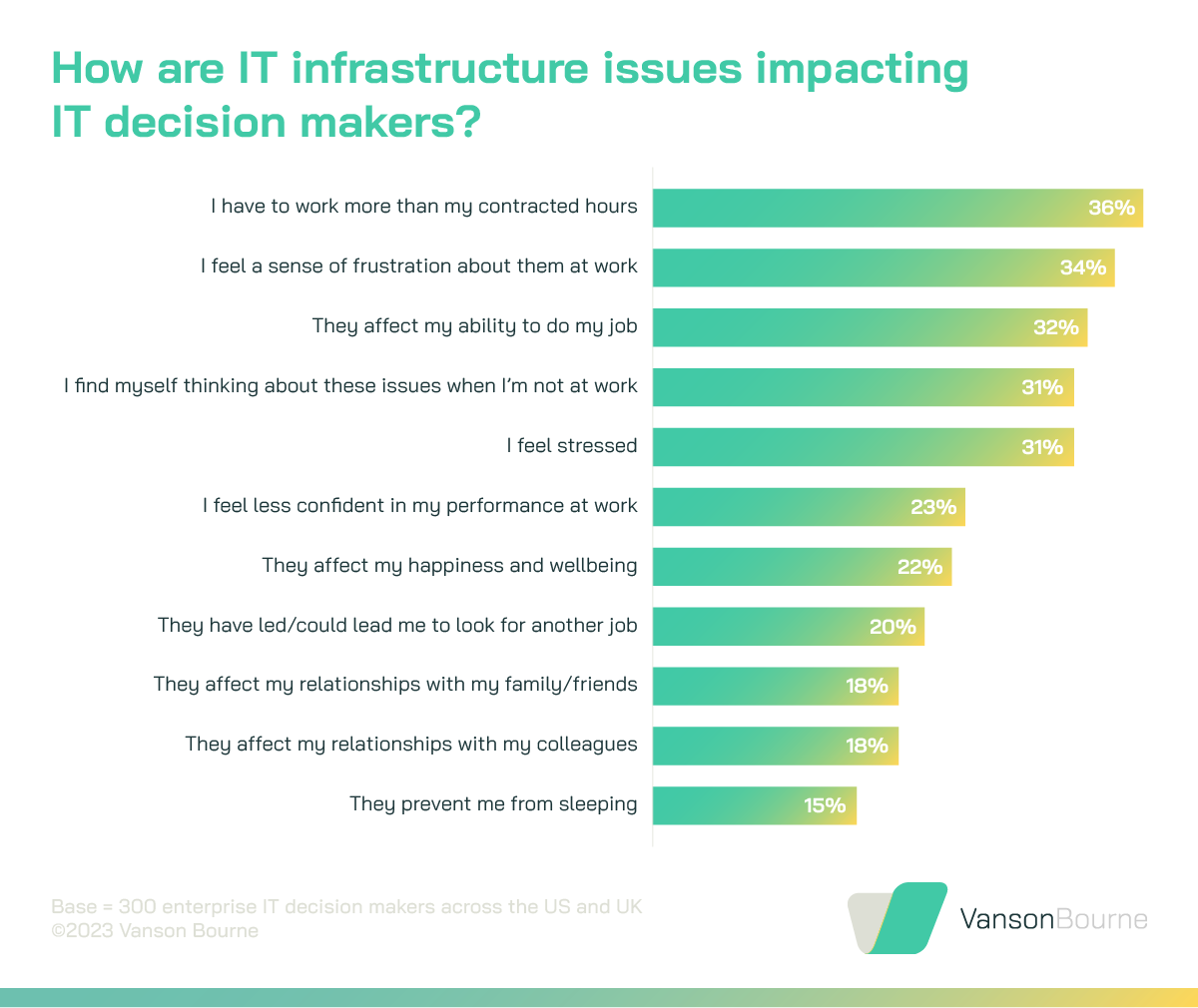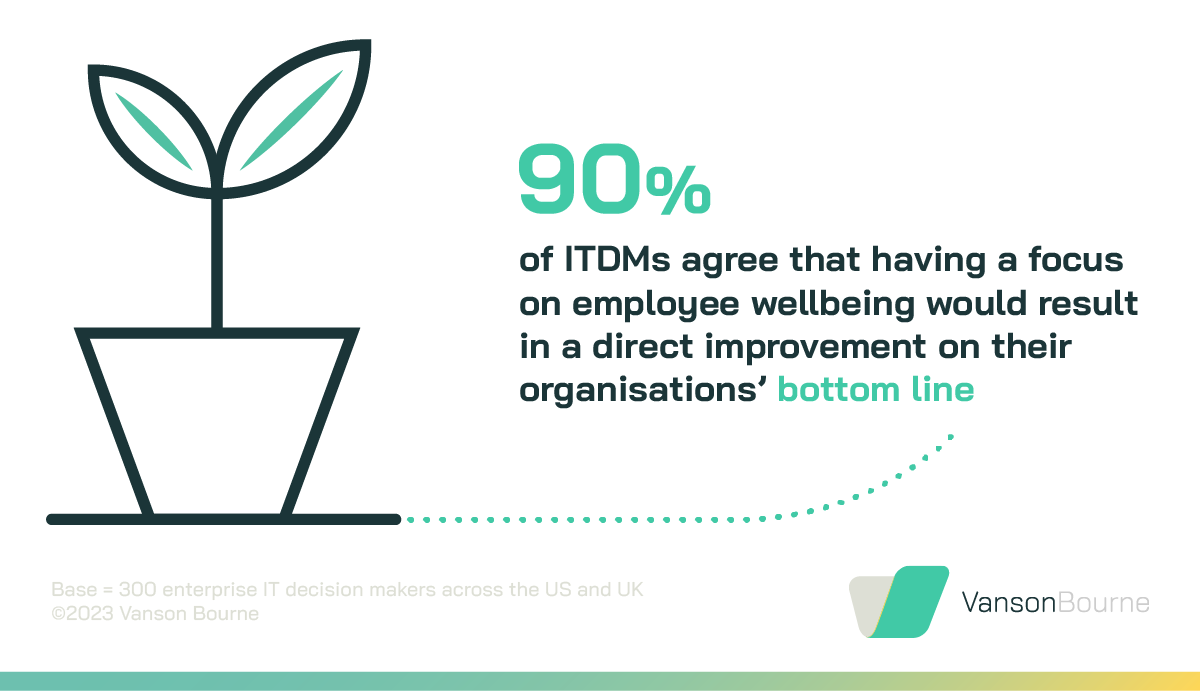Month: September 2023
Blog: Wellbeing in the IT department
Let’s start by thinking about a healthy, high performing, optimal IT infrastructure with a focus on wellbeing… According to the ITDMs we surveyed, contributing most are qualities such as security, for example in data storage, backups and within their networks (66%), controlled information access and availability (41%) and scalability (38%). Based on these qualities, how would you consider the health and performance of your organisation’s IT infrastructure? Perhaps somewhat of a pitiful basis for comparison is our respondents’ assessment of theirs.
Unfortunately, it’s not a gleaming picture – when asked to rate their current IT infrastructure overall, only around half (52%) believe it to be completely healthy, immune, high performing and optimal. Even when looking across the sectors surveyed, those from IT, technology and telecoms are most likely to report that their IT infrastructure is completely healthy, which may be expected as this is largely their turf and expertise, still only around six in ten (65%) report this. A similar story emerges when asking respondents about the various components of their IT infrastructure; the hardware, software and network within it. In fact, only a third (33%) of ITDMs in the UK consider their hardware to be completely healthy, the lowest of the three components.
Infrastructure pain points felt throughout the organisation
An IT infrastructure being in anything less than optimal health potentially leaves systems wide open to problems such as downtime, bugs, data loss, cyberattacks and latency. And, unfortunately, this is happening to our surveyed ITDMs pretty frequently – over half (53%) report experiencing these issues at least monthly. For those in the manufacturing industry, these kinds of challenges are happening weekly to around four in ten (42%).
Such issues are not localised to the IT department and this is not just an IT problem, Almost all (99%) report that their IT infrastructure plays a role in their organisations’ overall success or performance, and the majority (75%) consider that role to be significant. Alongside a similar proportion reporting the same about their organisation’s wellbeing (69%), it is not surprising to see the level and variety of impact ITDMs cite. Of those who experience issues with their IT infrastructure – the vast majority (96%) of our respondents – a similar proportion (95%) report that they impact their organisation in some way.

The knock-on impacts of IT infrastructure health and wellbeing to the organisation are seemingly wide reaching and somewhat nuanced, affecting not only its wellbeing and performance through increasing exposure to cyberattacks, affecting the bottom line, losing valuable data and the like, but also the hardworking employee within. While the latter can be less tangible and harder to measure, it is no less detrimental or important. Such impacts including reducing productivity and efficiency (51%), preventing employees from doing their jobs effectively (49%) and employees needing to work more as a result (33%) can even create a compounding effect; all having considerable negative impact to an employee’s stress levels, their health and wellbeing and consequently their performance.
Alarmingly, the vast majority (82%) – and nine in ten (90%) of those holding c-level and/or senior management positions – agree that their mental health and wellbeing is influenced by the health of their organisation’s IT infrastructure. Equally concerning, though, is that these figures seem to correlate with their physical health and wellbeing, with a similar proportion (78%) – and, again, around nine in ten (89%) in leadership positions – agreeing that their physical health and wellbeing is influenced.
Such stark effects are also evident by the variety of ways respondents report their organisation’s IT infrastructure issues to impact them personally. Most likely are that they have to work more than their contracted hours and that they impact their emotions by feeling a sense of frustration about them at work, with more than a third of ITDMs reporting these consequences.

It may be obvious that the health of an IT infrastructure plays a significant role in its organisation’s overall wellbeing and performance, however, would you consider it to play a similar one in your own personal wellbeing, success or performance? Perhaps surprisingly to some, or perhaps not considering the reported impacts, our results suggest that it does – and considerably. Similar to its role in the overall organisation, the vast majority cite that the health of their organisation’s IT infrastructure plays a role in their personal success or performance (97%) and their wellbeing (92%).
Reassuringly, however, an overwhelming majority (92%) of the ITDMs we interviewed agree that their organisation possesses a clear vision for having a healthy IT infrastructure. This indicates that, while organisations may not currently be as resilient or indeed digitally immune as they’d like to be, those working within the organisation are optimistic at the path ahead. With the right investment, training, and overall focus on increasing organisational wellbeing and IT infrastructure health, organisations can greatly improve their overall immunity, health, wellbeing, performance and, ultimately, success.
So, what can be done?
What can be done to enable IT infrastructures to be in their most optimum state, with a healthy immune system and potentially mitigate issues? As with humans, one place to start is to build resilience; IT teams can perform maintenance tasks such as software and hardware updates, auditing, monitoring and upgrading that will go a long way to ensuring their IT infrastructure is as healthy and as immune to bugs and issues as it can be.
Optimistically, at an overall level, the vast majority of our surveyed ITDMs report that they are performing these various maintenance tasks at least in line with recommendations, if not more. Indeed, almost all (99%) of our surveyed ITDMs consider them to build at least some resilience and immunity to prevent issues with their IT infrastructures. Perhaps IT teams don’t have the time or skilled resource to even consider the benefits of proactive maintenance, instead, their time is spent firefighting and remedying the frequent issues which leaves them burnt out and ineffective? Conceivable, as more than three quarters (78%) agree that theirs and their colleagues’ ability to maintain their organisations’ IT infrastructure would improve if more focus was aimed at their personal wellbeing.

Are wellbeing priorities starting to turn?
With the importance of wellbeing being integrated into increasingly more organisations worldwide, more needs to be done to understand the role it plays among the business and its employees. It could be argued that shifting priorities from an organisation-centric to a more employee-centric mindset is counterintuitive to the wellbeing of an organisation, yet it’s clear that the success of one cannot be achieved in isolation.
As per their human counterparts, organisations with a healthy (digital) immune system will always be better placed to defend themselves from unwanted contagions. As with any organism, the wellbeing of an organisation is directly linked to those who work within it, and leaders might be wise, therefore, to not only actively invest in the health and wellbeing of its IT infrastructure, but also its employees, given its impact on the bottom line.
The survey findings are based on quantitative interviews conducted in January 2023. As a member of the Vanson Bourne Community you’ll gain access exclusive to a variety of insights reports just like this one, based on research with our members.


